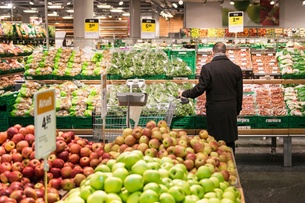Switzerland was the most expensive in Europe for food and non-alcoholic drinks in 2017 (+68% more than the EU average) (Keystone) Switzerland has been ranked the second-most expensive European country behind Iceland for consumer goods, which are 59% higher than the European Union average. Food and non-alcoholic drinks are particularly pricey. For the third year in a row, Switzerland was the most expensive in Europe for food and non-alcoholic drinks in 2017 (+68% more than the EU average, slightly down from 2016), according to Eurostat data for 2017 released on Wednesdayexternal link. But it was also the second most expensive European country for clothing (+53%) behind Iceland, and the third most expensive for hotels
Topics:
Simon Bradley considers the following as important: 3) Swiss Markets and News, Business, Featured, newsletter
This could be interesting, too:
Nachrichten Ticker - www.finanzen.ch writes Die Performance der Kryptowährungen in KW 9: Das hat sich bei Bitcoin, Ether & Co. getan
Nachrichten Ticker - www.finanzen.ch writes Wer verbirgt sich hinter der Ethereum-Technologie?
Martin Hartmann writes Eine Analyse nach den Lehren von Milton Friedman
Marc Chandler writes March 2025 Monthly

Switzerland was the most expensive in Europe for food and non-alcoholic drinks in 2017 (+68% more than the EU average) (Keystone)
Switzerland has been ranked the second-most expensive European country behind Iceland for consumer goods, which are 59% higher than the European Union average. Food and non-alcoholic drinks are particularly pricey.
For the third year in a row, Switzerland was the most expensive in Europe for food and non-alcoholic drinks in 2017 (+68% more than the EU average, slightly down from 2016), according to Eurostat data for 2017 released on Wednesdayexternal link.
But it was also the second most expensive European country for clothing (+53%) behind Iceland, and the third most expensive for hotels and restaurants (+63%), behind Iceland and Norway.
Personal transport was close to the EU average. Electricity, gas and other fuels were more expensive (+7%), while consumer electronics (-5%) and furniture (-9%) were cheaper than the EU average.
According to the Federal Statistical Officeexternal link, in 2014 the median monthly gross salary of a single Swiss adult was CHF6,250 (€5,420). While Swiss salaries might seem higher than in other countries – especially in some sectors – the cost of living in the small alpine country is very high. For example, people spend about a third of their income on rent alone. Inflation has remained very low in recent years.
Switzerland ranks among the leaders in Europe for purchasing power, either in terms of gross domestic product per capita (+58% above the EU average), or actual individual consumption (AIC) per capita, which is a calculation of all goods and services actually consumed by households (+26%).
Tags: Business,Featured,newsletter
